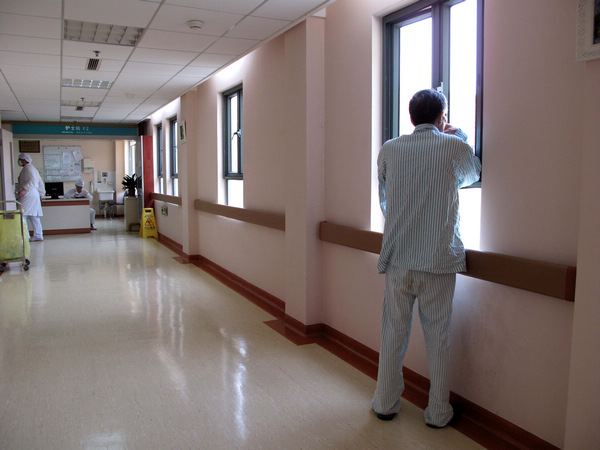Privacy becomes core healthcare issue
Updated: 2012-03-15 07:44
By Shi Yingying (China Daily)
|
||||||||
Registering support
Many experts in the fields of medicine and law, however, have been advocating the introduction of a real-name system for HIV screening for some time.
Among them is Wang Yu, director of the Chinese Centers for Disease Control and Prevention, who has hailed it as a way to effectively prevent the spread of a fatal disease and help provide the infected with lifelong treatment.
 |
|
A ward at a Fudan University hospital in Shanghai that specializes in HIV patients. The number of new cases reported annually is about 48,000, according to estimates. [Gao Erqiang / China Daily] |
"HIV carriers might spread the virus to others through unprotected sex or other channels. Should we protect their privacy or control the epidemic?" he said at a Ministry of Health news conference on Feb 8.
He added that ensuring authorities have access to the contact information of those infected will "solve the problem in a positive way, not hide it".
Yang Shaogang, a Shanghai attorney with experience in court cases related to HIV and AIDS, also agreed that requiring people to hand over their ID cards before getting screened would do more good than harm.
Last year, he represented a woman who sued her ex-boyfriend for infecting her with HIV. During the trial, the defendant admitted he had withheld news of his diagnosis during the couple's relationship.
"Although many people are worried about the risks of their personal data being leaked, this (Guangxi's real-name proposal) is necessary for maintaining the safety of society," he said. "In the drafted legislation, people infected with HIV should tell their sexual partners. There is no such specific article in Criminal Law about intentional transmission of HIV."
People are already required to present identification at centers that offer blood-screening services in Kunming and Beijing.
Statistics from the Beijing CDC show that since the regulation was introduced at the capital's 40 or so government-run clinics in July last year, the daily number of people going for preliminary screening has dropped from 12 per clinic to as few as three.
Meanwhile, in Yunnan, where the policy has been in place since 2007, more clinics are abandoning the practice of requesting ID cards.
"Just two out of every 12 CDCs or authorized clinics in the province follow the rule of requesting a client's name. The rest skip the ID check," said Chang Kun, director of He'erbutong, an NGO in Henan province that offers legal assistance to HIV carriers.
"I don't see any point of bringing in a regulation that medical center workers are forced to violate," he said, referring to Guangxi's upcoming legislation. "Protecting someone's privacy doesn't conflict with the State's desire to control the source of infection. The problem lies in people's lack of trust."

 Relief reaches isolated village
Relief reaches isolated village
 Rainfall poses new threats to quake-hit region
Rainfall poses new threats to quake-hit region
 Funerals begin for Boston bombing victims
Funerals begin for Boston bombing victims
 Quake takeaway from China's Air Force
Quake takeaway from China's Air Force
 Obama celebrates young inventors at science fair
Obama celebrates young inventors at science fair
 Earth Day marked around the world
Earth Day marked around the world
 Volunteer team helping students find sense of normalcy
Volunteer team helping students find sense of normalcy
 Ethnic groups quick to join rescue efforts
Ethnic groups quick to join rescue efforts
Most Viewed
Editor's Picks

|

|

|

|

|

|
Today's Top News
Health new priority for quake zone
Xi meets US top military officer
Japan's boats driven out of Diaoyu
China mulls online shopping legislation
Bird flu death toll rises to 22
Putin appoints new ambassador to China
Japanese ships blocked from Diaoyu Islands
Inspired by Guan, more Chinese pick up golf
US Weekly

|

|






